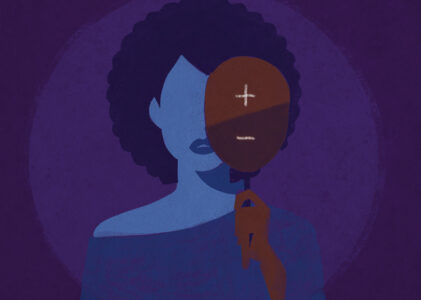Many people struggle with bipolar symptoms but get diagnosed with something else. Without effective treatment, life can feel difficult or even unbearable. Learn the signs to get the right help.
Bipolar disorder is one of the most common and debilitating mental health disorders in the US. It affects an estimated 4.4% of US adults at some point in their lives. Symptoms can wreak havoc on relationships, work, and everyday life. Tragically, people with bipolar disorder are 10-30 times more likely to die by suicide than people in the general population.
Given how common and severe these symptoms can be, it’s vital that people struggling with bipolar disorder receive an accurate diagnosis and effective treatment. Sadly, just the opposite often happens. In fact, bipolar disorder may be one of the most misdiagnosed mental health conditions. Why is this and what can we do about it?

What is bipolar disorder?
Bipolar disorder causes extreme mood swings from emotional highs (mania or hypomania) to lows (depression). You may feel euphoric, full of energy or unusually irritable for several days or longer and then feel depressed for awhile before settling back into a stable period. These mood swings can affect your judgment, behavior and ability to think clearly. Episodes may occur rarely or multiple times a year.
Bipolar Highs
These periods are referred to as mania or hypomania, depending on duration and severity. Symptoms of mania usually last about a week, are more severe and cause more negative consequences. Symptoms of hypomania often last several days and cause less significant disruption to your life.
During these periods, you might feel very elated, on top of the world, or extremely irritable, much more than your normal self. While you’re feeling elated or irritable, you’re probably also engaged in many more activities than usual or feeling remarkably energetic.
During this same period of a few days to a week, you may experience some or all of these symptoms:
- Increased self-esteem or grandiosity. You feel like you’re an exceptional person, and the sky’s the limit for what you can accomplish. You might even think you have special powers that others don’t have.
- Decreased need for sleep. You need much less sleep than usual for days in a row. You feel rested even after just a few hours of sleep.
- Pressured speech or increased talkativeness. You’re more talkative than usual. You might even feel a strange pressure to keep talking. Others may have trouble getting in a word when talking to you.
- Flight of ideas or racing thoughts. Thoughts rush through your mind so rapidly that you can’t talk fast enough to articulate them, and you may leap from one topic to the next. This makes it challenging or impossible for people to follow your train of thought.
- Distractibility. You have trouble focusing on one thing and may jump from one activity to the next. Remember, this is different from your normal self and occurs along with the other symptoms.
- Increase in goal-directed activity or psychomotor agitation. You feel compelled to engage in lots of different activities socially, at school, at work or at home. You might decide to paint the garage, start a book club and take on extra projects at work all in the same few days. Alternatively, you might feel very physically agitated (pacing, unable to sit still) without engaging in activities or producing anything.
- Excessive involvement in activities that are likely to cause you painful consequences. You might feel driven to buy lots of things you don’t really need (or can’t afford), engage in riskier sexual behavior than usual, or sink money into unwise business investments. These behaviors may cause conflict with your loved ones or even land you in legal trouble.
Bipolar Lows
These periods may look similar to a Major Depressive Episode, in which you feel sad, down or less interested in things for a couple weeks or longer in addition to experiencing symptoms related to energy, sleep, appetite, cognitive changes and more.
However, some research suggests that in comparison to unipolar depression (depression with no history of mania or hypomania), bipolar depression more often involves:
- Symptoms developing at a relatively young age
- Feeling more withdrawn
- Feeling slowed down – moving slowly, talking slowly
- Sleeping too much
- Not responding to antidepressant medication
- Having briefer episodes that reoccur more often
- Experiencing psychotic features
- Using substances
- Attempting suicide
- Having a family history of bipolar disorder
It’s important to note that the above-listed symptoms and factors won’t apply to everyone. Whether you experience some or all of them isn’t sufficient for determining whether you have unipolar or bipolar depression. Rather, this information may help you or your clinician more easily recognize potential diagnoses.
Why is bipolar disorder so difficult to diagnose?
There are a variety of reasons bipolar disorder may get overlooked or misdiagnosed, such as:
- People with bipolar disorder tend to experience depressive episodes prior to developing manic or hypomanic episodes. They may get diagnosed with a unipolar depressive disorder (such as major depression) and never get re-assessed for bipolar disorder.
- The symptoms of bipolar disorder overlap with symptoms from other disorders such as ADHD or borderline personality disorder. People with autism may also share some features. This can make it difficult to distinguish one diagnosis from another.
- Clinicians may not ask enough questions or assess a patient’s symptom history fully enough.
- Patients may not recognize or remember manic symptoms. They also may feel uncomfortable talking honestly and openly about their symptoms. For these reasons, it can be helpful for clinicians to talk to family members who may be able to provide important details.
Tips for getting a more accurate diagnosis
If you suspect you might have bipolar disorder, here are a few things you can do to gather information about your symptoms that may assist your clinician.
- Think about periods of highs and lows over the course of your life. Have you had “high” periods that lasted several days or longer that occurred for no apparent reason? For example, you were on top of the world for days even though nothing special was happening around you. You weren’t on vacation, you didn’t win a prestigious award, and you weren’t abusing stimulants.
- Even if these highs felt good, did you tend to get into trouble for your behavior during those times? Debt? Conflict in relationships, at work, or even with strangers on the street? Legal trouble?
- What other symptoms (if any) did you notice during those periods?
- If you feel comfortable, talk to family and friends about their perspective on your behavior. Have they noticed periods of a few days or longer where you seemed very different from your usual self – on top of the world or irritable and angry – for no apparent reason? During those times, did they worry about you? Did they “walk on eggshells” with you because you were so touchy or irritable? What else did they notice during those times?
It may be helpful for you to write down details and approximate dates of highs and lows that you’ve experienced and share them with your clinician.
Next Steps
Bipolar symptoms can make life challenging. Fortunately, effective treatments are available.
If you suspect that you or someone you love struggles with bipolar symptoms, accurate diagnosis is important to get the treatment you need to live a happier, more peaceful and productive life.
Call your doctor or contact Athena Care for mental health care in Tennessee.
One of our Care Coordinators will help you get the care you need.

Rachel Swan, MS
Editor
Rachel has a Masters of Science in Clinical Psychology from Vanderbilt University, where she spent 16 years as a Research Analyst in the Psychology and Human Development Department.


